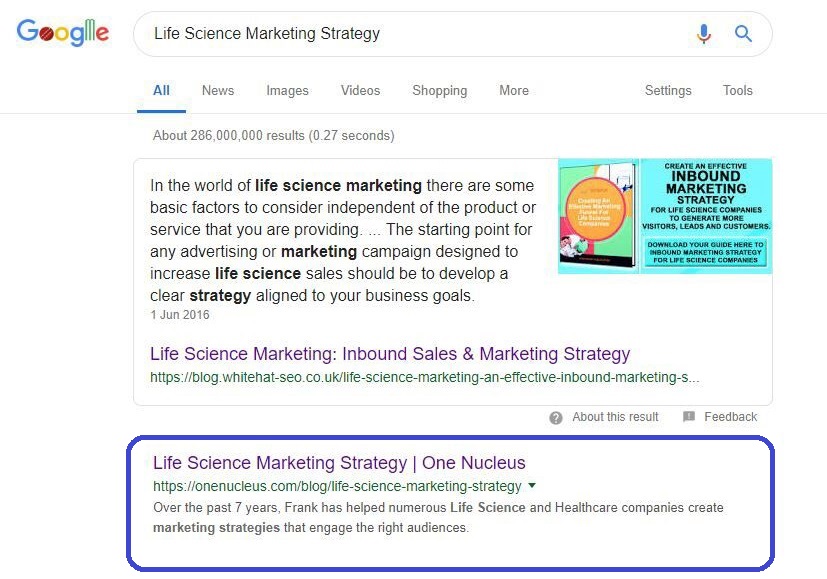Digital Marketing and Life Sciences are more similar than you might think.
Both are multi-billion dollar industries that use testing and logic to prove hypotheses. Both markets use big data sets, whether it’s recording vast experimental results or simply organising the world’s information online.
The simplest similarity, however, is the enormous growth potential of both SEO and Life Sciences.
Some of the latest innovations in Life Science spaces have made incredible scientific feats commonplace. Nowadays, documenting the human genome is readily available to consumers on a global scale. Commercial DNA databases such as Ancestry.com and 23AndMe, who specialize in extended family trees and DNA-based health recommendations, have even been instrumental in solving decades-old cold murder cases.
The infamous Golden State Killer, Joseph James DeAngelo, had meticulously evaded capture for over 40 years…The one thing that he didn’t count on however, was the popularity of commercial DNA testing. His relatives, in their inquisitiveness to learn more about their ancestry and health risks, had inadvertently narrowed down the search from a few hundred million people to a few dozen.
The Story of SEO
Rewind a couple of decades to Stanford University where Larry Page and Sergey Brin founded Google, a search engine for organizing the world’s information online in 1998.
In 2019 there are 1.94 billion websites on the internet. That’s nearly 1 WEBSITE for every 4 people currently alive on the planet.
The founders of Google realized the growth potential for the internet, and although they were by no means the first search engine, they had a vision for how to be the greatest; by providing the best possible search results for the user.
The early algorithm may well have been susceptible to ranking sites that used unethical SEO tactics such as keyword stuffing and link farming. However, it has since evolved considerably and has always stayed true to the mission of providing the most relevant search results and the best user experience.
User Experience
First things first, you should create your content with a Life Science audience in mind. In its early years, search engine optimization had a stigma around it; being associated with the aforementioned black hat tactics.
Nowadays, the algorithm is so sophisticated, that Google seems to have unlimited people (bots) reading and ranking content according to a long list of ranking factors, which have been tweaked and incrementally improved over the search engine’s brief history.
The above-featured snippet from News-Medical Life Sciences shows how Google emphasizes user experience by attempting to solve the query in as few clicks as possible.
Relevance
How relevant is the content to the keywords which you have optimized for? Below shows a Google search result for One Nucleus in a previous blog piece.

Despite being less than a month old, the term Life Science Marketing Strategy ranks organically in position 1 because the keywords are 100% relevant to the subject matter.
Popularity
Google uses metrics such as time on page, bounce rate, and links as contributing factors within its complex algorithm to determine popularity. It will also lend more weight to actions taken such as a form fill in or a brochure download.
The above shows a screenshot of Google Analytics for the article. The high number of page views and average time on page are positive ranking factors as well as a low bounce rate.
Expertise, Authority, and Trust in Life Sciences
One of the latest algorithm updates was the EAT (Expertise, Authoritativeness, and Trustworthiness) update. In 2018, many sites in the medical and healthcare space were hit with this latest iteration.
A few simple steps can be taken to add that extra layer of expertise, authority and trustworthiness to you site.
Celebrate your authors by displaying authorship details: qualifications, job titles, and experience. Also, take steps to improve your About Us page by providing certification, business address, testimonials, and reviews.
Finally, use SEO tools to look at technical SEO fixes such as sitemaps, secure protocols, broken links, missing meta information and more.
About AZoNetwork
AZoNetwork specializes in Digital Marketing and SEO for Life Sciences, Medical and Healthcare companies. We have provided over 750 SEO health checks for companies in the above industries. Sign up today for your free SEO health check.
About the Author
Dave Cockett is Head of SEO and Web Services at AZoNetwork. Having previously worked for blue chips such as Lycos, MSN and Ask Jeeves, Dave now specializes in developing web strategies for companies in Scientific industries.
The One Nucleus blog is written by individuals and is not necessarily a reflection of the views held by One Nucleus. Please email [email protected] for more information on 'guest blogging'.
